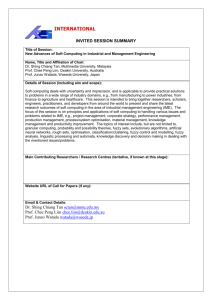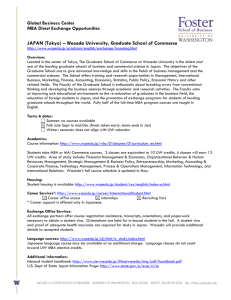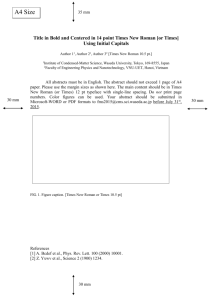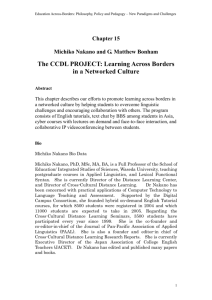Paal 2013
advertisement
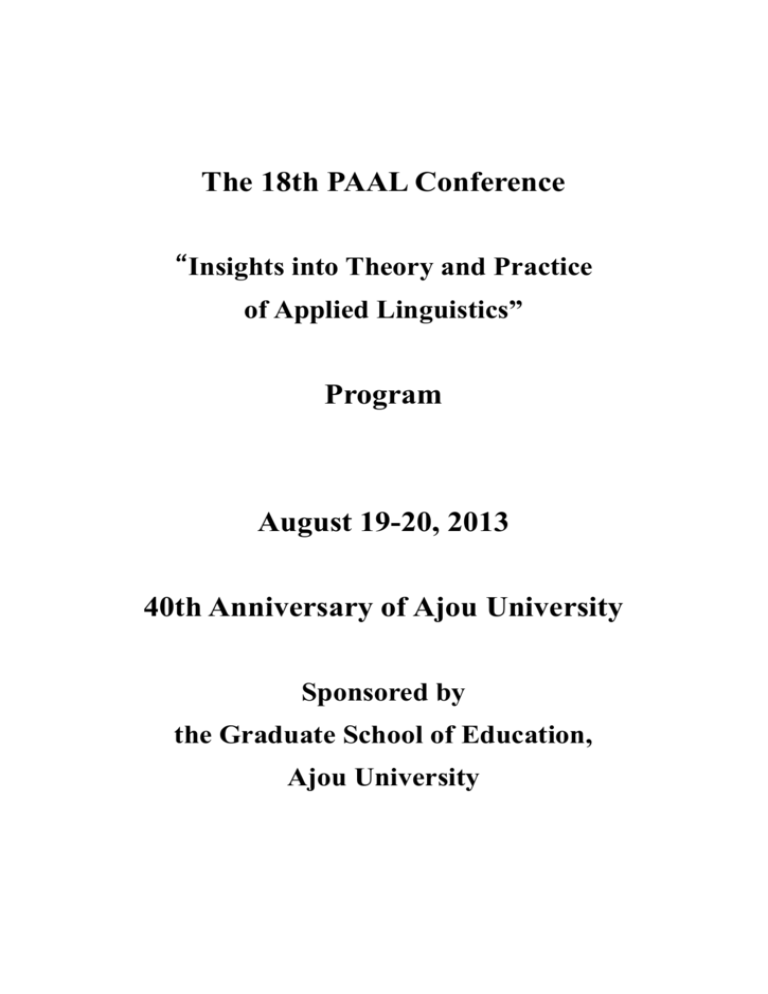
The 18th PAAL Conference “Insights into Theory and Practice of Applied Linguistics” Program August 19-20, 2013 40th Anniversary of Ajou University Sponsored by the Graduate School of Education, Ajou University Congratulatory Speech Seok Hyun Nam, Ph.D. Dean of Graduate School of Education Ajou University Co-chairpersons of the Pan-Pacific Association of Applied Linguistics, Professor Michiko Nakano and Professor Han Ho, Honorary Chairperson and Co-founder, Emeritus Professor Kyung-Ja Park of Korea University, Keynote Speakers, Professor Chiu-yu Tseng of Institute of Linguistics Academia Sinica and Professor Michiko Nakano of Waseda University, and all the members of PAAL, I would like to extend my sincere congratulations on holding the 18th Conference of PAAL at Ajou University. I am honored and pleased to welcome you on behalf of our entire faculty. Ajou University commemorates its 40th anniversary this year. Ajou University is a research-centered private university which has grown into one of Korea’s most prestigious universities in a short period of time since 1973. It has been making a great leap forward to become a world-class university taking a lead in convergence studies by 2023. The Graduate School of Education is founded in 1995 with an aim for the cultivation of competent teachers and retraining of professional and special school teachers to respond to a rapidly changing education environment and new demands for education. The School offers a variety of programs for various majors and all the faculty members are exerting their greatest effort in raising globally talented teachers with good personalities, cutting-edges knowledge, and outstanding practical abilities. I have a special interest in learning, teaching, and researching foreign languages. I therefore wish to convey my sincere support for holding this international conference. The 18th conference of PAAL, I believe, has all the more meaning. If I may compare it to a human being, becoming 18 years old is a critical point in his or her development towards adulthood. At this critical moment, I think it is indeed meaningful to hold the conference with the theme "Insights into Theory and Practice of Applied Linguistics” in which participants can share the importance of exchanging expert knowledge of teaching English and creating a new paradigm of English education, particularly in Asian countries. I understand this conference will hold within two days and I believe will be a very meaningful event for everybody. I truly hope that all the participants will make this academic conference even more successful by engaging in stimulating discussions and exchanging expertise. I wish you a happy and pleasant time while staying in our school and Suwon. Thank you. (Aug. 19th, 2013) 1 Conference Schedule Day 1: 19th of August Jonghap Hall, Ajou University 09:00-10:00 Registration Opening Address (Prof. Han, Ho) Moderator (Prof. Ano, Koichi) 10:00-10:30 (#104-Jonghap Hall) 10:30-12:00 Session A (#712) Session B (#713) Session C (#810) A-1 B-1 C-1 A-2 B-2 C-2 A-3 B-3 C-3 12:00-13:30 Lunch Keynote I (Prof. Tseng, Chiu-yu) Moderator (Prof. Lee, Eunpyo) 13:30-14:40 (#104-Jonghap Hall) 14:40-15:00 15:00-16:30 Break Session E (#713) D-1 E-1 (P 1- 28) D-2 E-2 (14:40-16:30) D-3 E-3 16:30-16:50 16:50-17:50 18:30- Poster Session Session D (#712) Break Session F (#712) Session G (#713) F-1 G-1 F-2 G-2 Banquet (Moderator: Prof. Maeng, Unkyoung) 2 Lobby, 1st floor Day 2: 20th of August Jonghap Hall, Ajou University 09:30-11:00 Session H (#712) Session I (#713) Undergraduate(#810) H-1 I-1 U-1 H-2 I-2 U-2 H-3 I-3 (09:30-10:30) 11:00-11:20 Break Keynote II (Prof. Nakano, Michiko) Moderator (Prof. Kim, Hyun Jin) 11:20-12:30 (#104- Jonghap Hall) Lunch 12:30-14:00 Board Meeting 14:00-15:30 Session J (#712) Session K (#713) Session L (#810) J-1 K-1 L-1 J-2 K-2 L-2 J-3 L-3 15:30-15:50 15:50-16:50 Break Session M (#712) Session N (#713) Session O (#810) M-1 N-1 O-1 M-2 N-2 O-2 16:50-17:00 Break Closing Address (Prof. Nakano, Michiko), Moderator (Prof. Choi, Kyunghee) 17:00-17:30 (#104-Jonghap Hall) 3 Contents Keynote Speech I. Why L2 English is less natural?—A prosody perspective Tseng, Chiu-yu (Institute of Linguistics Academia Sinica) II. English language education reforms at Waseda University Nakano, Michiko (Waseda University) Congratulatory Address Nam, Seok Hyun (Dean of Graduate School of Education, Ajou University) Oral Presentation Day 1: 19th of August Session A: 10:30-12:00, Moderator: Prof. Chang, Bok-Myung A-1 L2A of the English Preposition ‘with’ Bong, Miki H. K. (Shinshu-University) A-2 The demotivation of Chinese EFL students at the tertiary level Liu , Xiaofei (Waseda University) A-3 Multiple goals and complex EFL motivation: A mixed methods study in a Chinese context Ding, Ting (The University of Sydney) Session B: 10:30-12:00, Moderator: Prof. Ueda, Norifumi B-1 Japanese university students’ motivation to be an English teacher―Focusing on students taking an English teaching methodology class― Uenishi, Koji (Hiroshima University) B-2 Teacher development as reflective practitioners Machimura, Takako (Chiba University) B-3 Investigation of university English teachers' motivation in Japan Tsutsumi, Rie (Hiroshima University) 4 Session C: 10:30-12:00, Moderator: Prof. Lee, Hikyoung C-1 Distance chatting and tourism English for communicative competence Kim, Jung-hee (Baekseok University) C-2 Responses to recasts and ESL question development Asari, Yoko (Waseda University) C-3 EFL learners’ positive perception with regard to reviewing their classroom performances Okada, Yasuko (Seisen University) Session D: 15:00-16:30, Moderator: Prof. Kim, Jung-hee D-1 The challenge of teaching modern American literacy texts to Emirati/ EFL Learners Gouhar, Saddik (UAE University) D-2 Development of instructional models for teaching intercultural communication to Japanese students Matsumoto, Kahoko (Tokai University) D-3 My English progressive isn't progressing: Transfer and learnabiliy Hahn, Hye-ryeong (Seowon University) Session E: 15:00-16:30, Moderator: Prof. Park, Hyesook E-1 Oral and silent reading comprehension of different levels of text information among EFL readers Fujinaga, Fumihisa (Waseda University) E-2 The effect of graphic organizers upon L2 reading comprehension Kii, Yuta (Waseda University) E-3 The relationship between L2 listening span recall and L2 listening proficiency Satori, Miki (Aso College) Session F: 16:50-17:50, Moderator: Prof. Yi, Jyi-yeon F-1 A study of self-assessment of topic development in written production among high school students Oi Suganuma, Yoko (Waseda University) F-2 Error analysis of Asian learner's oral English in international schools Chenli, Shen (Shanghai High School) 5 Session G: 16:50-17:50, Moderator: Prof. Hahn, Hye-ryeong G-1 Negotiation strategy in LiveOn setting and its role in vocabulary acquisition among Chinese Students Feng, Jinjin / Chen, Yongjie / Shen, Ruimin / Oya, Masanori (Shanghai Jiao Tong University / Mejiro University) G-2 Development of an eBook widget suite for critical reading & writing Enriquez, Guillermo / Yoshida, Satoshi / Nakano, Michiko (Waseda University) Day 2: 20th of August Session H: 9:30-11:00, Moderator: Prof. Tsutsui, Eiichiro H-1 Calibration of national center test items against the common European framework of reference for languages Sugino, Naoki / Nakano, Michiko / Shimizu, Yuko / Shojima, Kojiro / Yamakawa, Kenichi / Ohba, Hiromasa (Ritsumeikan University / Waseda University / Ritsumeikan University / National Center for University Entrance Examinations / Yasuda Women's University / Joetsu University of Education) H-2 School-based assessment in the new senior secondary school curriculum in Hong Kong: Voices of the administrative and teaching stakeholders Mak, Barley Shuk-yin (Centre for Enhancing English Learning and Teaching (CEELT) & The Chinese University of Hong Kong) H-3 Applying Naïve Bayes Classifier to the score prediction in L2 performance assessment Kondo, Yusuke (Waseda University) Session I: 9:30-11:00, Moderator: Prof. Oya, Masanori I-1 Comparing two types of tasks in L2 pronunciation learning: Evidence from Chinese ESL learners Lan, Yizhou (City University of Hong Kong) I-2 The effect of a segment- and suprasegmental- focused teaching on perceived comprehensibility Sugiuchi, Mitsunari (Waseda University) I-3 Production of English intonation by Japanese learners Kitagawa, Aya (Keio Senior High School) 6 Session J: 14:00-15:30, Moderator: Prof. Negishi, Junko J-1 The styles of newly-created Korean lexicon rooted in English Lee, Nari (Korea University) J-2 A data based study of Chinese EFL learners metaphorical competence Yi, Yingli (Harbin Engineering University) J-3 Doing pragmatics of names in advertising language Chang, Vincent Tao-Hsun (National Chengchi University) Session K: 14:00-15:30, Moderator: Prof. Kim, Sung Hye K-1 Japanese junior high school students’ awareness and understanding of coherence Tatsukawa, Keiso (Hiroshima University) K-2 The analysis of junior high school textbooks with a focus on tasks Shioda, Hiroaki / Hosaka, Yoshio (Kyushu University / Takushoku University) Session L: 14:00-15:30, Moderator: Prof. Owada, Kazuharu L-1 Developing an effective questionnaire to investigate learners' multilayered structure Matsuoka, Rieko / Matsumoto, Kahoko / Tsutsumi, Rie (National College of Nursing, Japan / Tokai University / Yokohama National University) L-2 Assessing fluency in attriting English: A case study of two Korean sisters Kang, Sang-Gu (Korea University) L-3 An assessment of the viability of casual corpus concordancing for the mass market University English classroom Thornton, Sean M. (Toyo University) Session M: 15:50-16:50, Moderator: Prof. Kondo, Yusuke M-1 Feedback effect on university students' sentence writing Seong, Myeong-Hee / Reed, Jeniffer (Eulji University) M-2 Teaching local culture to EFL Learners: A multiple approach to pedagogy Chuo, Tun-Whei (Wenzao Ursuline University of International Studies) Session N: 15:50-16:50, Moderator: Prof. Kang, Sang-Gu N-1 A dynamic usage based Communicative Language Teaching Approach: How effective is it? Irshad, Mufeeda (University of Groningen, University of Sri Jayewardenepura) N-2 Genre analysis of international hotel homepages: a cross-cultural study Cheng, Fei-Wen / Hsu, A-Chiu (National Chiayi University) 7 Session O: 15:50-16:50, Moderator: Prof. Yang, Eun-Mi O-1 Provision for Asian students at an English-medium university: can we do better? Arthurs, James (University of Nottingham Ningbo China) O-2 Vocabulary learning strategy use of Korean elementary school students Bae, Eunsil (Ajou University) (Poster session) Day 1: 19th of August (Lobby, 1st floor) Session P: 14:40-16:30 P-1 A Longitudinal Study on Japanese University Students’ Motivational Styles Toward Learning English in CMC Activities Yoshida, Satoshi / Nakano, Michiko (Waseda University) P-2 A study on prediction of L2 learner’s vocabulary knowledge by application of Latent Rank Theory to a vocabulary test Ueda, Norifumi / Owada, Kazuharu / Tsutsui, Eiichiro (Komazawa University / Tokyo College of Music / Hiroshima International University) P-3 An analysis of English pronunciation of Japanese learnersⅡ: In search of effective factors in pronunciation teaching from the viewpoint of EIL Tominaga, Yuko (University of Tokyo) P-4 Detecting grammatical errors based on Xerox Linguistic Environment (XLE) Ishii, Yutaka (Waseda University) P-5 Cross-Cultural Distance Learning: a case study of an experiment between a Japanese school and a Australian school Koyama, Aiko (Waseda University) P-6 Effectiveness of movie watching on medical students’ English communicative competence Lee, Eunpyo (Eulji University) 8 P-7 English teachers' tendancey in using English personal deixis for communication in the school context Azkia, Nurul (Sampoerna School of Education) P-8 Examination of corpus-based vocabulary list for younger learners of English in Japan Koga, Yuya (Waseda University) P-9 Incorporating productive skills and fluency development into regular e-learning activities Tsutsui, Eiichiro (Hiroshima International University) P-10 Japanese English learners' preference for unaccusative verb forms in the animation-based context: A case study Owada, Kazuharu / Tsutsui, Eiichiro (Tokyo College of Music / Hiroshima International University) P-11 Korean College Students’ Global Educational Activities and English Learning Motivation Yang, Eun-Mi (Kkottongnae University) P-12 L2 learners' attitudes and preferences towards English classes Negishi, Junko (Tsurumi University) P-13 L2 Motivational Self System and WTC in Korean Learners’ of English Park, Hyesook (Kunsan National University) P-14 Motivational effect of English learners with multiculturalism in English textbooks Im, Hyunsun (Korea University) P-15 Qualitative analysis of students’ reflections on Cross-Cultural online discussions Watanabe, Akiko (Waseda University) P-16 Quantifying the quality of ELF learners’ written productions with Coh-Metrix Yoshida, Satoshi / Nakano, Michiko (Waseda University) P-17 Reaction to fake Kanji and Korean characters by learners of Japanese from non-Chinese character areas: A longitudinal study Okita, Yoko (Tokyo Medical and Dental University) P-18 Students' and lecturers' perception of EMI engineering courses Hwang, Seon-Yoo (Seowon University) P-19 Suggestions for an effective drama course in an EFL context Seong, Myeong-Hee (Eulji University) 9 P-20 Evidence for the early onset of grammatical categories: Quantificational phrases Shin, Yu Kyoung (Sogang University) P-21 The use of Moodle as a tool for conducting and collecting data from animation-based tasks on English verbs Tsutsui, Eiichiro / Owada, Kazuharu / Ueda, Norifumi (Hiroshima International University / Tokyo college of Music / Komazawa University) P-22 Theory and practice of effective debate class for English learners Matsumura, Kana / Nakano, Michiko (Hosei University Junior and Senior High School / Waseda University) P-23 Treatment of zero pronouns in the framework of Lexical-Functional Grammar Oya, Masanori (Mejiro University) P-24 Code-Switching Behavior of Bilingual Teenagers’ Language in Bicultural Families Lee, Jeongsook / Maeng, Unkyoung (Ajou University) P-25 A demonstration of smart-phone application of the Waseda Cyber Course: World Englishes and Miscommunications Nakano, Michiko (Waseda University) P-26 Policies for promoting practical English education in Korea Kim, Sung Hye (Korea Institute for Curriculum & Evaluation) P-27 What native and non-native speakers of English get out of CCDL Owada, Kazuaharu / Lee, Hikyoung (Tokyo College of Music/ Korea University) P-28 Pre-service English teachers' classroom observation using COLT Scheme and perception on it Yang, Sunmi / Yi, Jyi-yeon (Chongshin University) 10 (Undergradate session) Day 2: 20th of August (Room #810) Session U: 9:30-10:30 U-1 A new approach to junior high school English classes ―How have the students been changing while using an English textbook repeatedly in a year?― Nakayama, Kyoko / Komoda, Fuuta / Iida, Shuhei / Saito, Natsuki / Hasegawa, Hitomi / Suzuki, Satomi (Bunkyo University) U-2 A study on popular TV English programs in Japan: How can we make good English learning materials for college students? Masamoto, Sumire / Hayakawa, Sayumi / Hasegawa, Eri / Ueno, Yoriko / Takeda, Kazunari / Koike, Mayu (Bunkyo University) Information Cafeteria: A) 12F of Jonghap Hall (Building number: 33) B) 1F & B1 of Well-Being Health Center (Building number: 43) Refreshments: #706 at Jonghap Hall (Building number: 33) 11 <Keynote I> Why Is L2 Less Natural?—A Prosody Account Chiu-yu Tseng Institute of Linguistics, Academia Sinica, Taipei, Taiwan cytling@sinica.edu.tw Abstract This paper is about what prosody is when speaking in units that are more than one sentence at a time, and in what way prosody makes speech sound natural and more intelligible. The discussion will focus on how in addition to linguistically defined prosody, it is mainly discourse associations, pragmatics and information structure that contributes to more expressive and natural sounding speech which is in fact more intelligible. Our approach to analyze and understand prosody phenomena is a relative one, hence degree of contrast and contrast patterns are used to test and illustrate while arguments are based on prosodic differentiation patterns that set L1 and L2 speech apart. Acoustic analysis of units and patterns of chunking and phrasing with boundary properties and pauses will be used to illuminate discourse associations; while perceived accentuation are analyzed by contrast degree as representation of keyword landmarks and speaker intention. Examples and evidence is derived using corpus linguistic approach and computational modeling. Issues presented are discourse associations and global prosody, discourse boundaries, stress patterns, focus and post-focus compression. Robust contrast is therefore necessary to make differentiation distinct. General L2 features, i.e., slower speaking rate, more intermediate units and pauses, highly varied intonation patterns, less distinct stress patterns and less post-focus compression, decrease the degree and of contrast robustness and makes L2 speech less expressive. Under-differentiated expressions are therefore a major reason of why L2 speech is less natural. 12 <Keynote II> A Personal Perspective: Educational Reforms of English Language Learning at Waseda University Michiko Nakano Faculty of Education and Integrated Arts and Sciences, Waseda University nakanom@waseda.jp Abstract The presentation summarizes the major courses I organized in the past 17 years at Waseda University. Particular focus is set on the relationship between Common European Framework of Reference for Languages (CEFR) and the courses opened at Open Education Center. After some linkage with the CEFR was experimentally shown, the courses were submitted to Accreditation Council of Practical Skills (ACPA) as a form of external course evaluations. ACPA tentatively granted to issue certificates for the students if and only if the students showed the mastery over General English Tutorials, Discussion Tutorials and Cross-Cultural Distance Learning Courses. The presentation explains the data submitted to ACPA as well as our grade assessment. It is demonstrated also that the three courses combined might be similar to the Cabinet Office’s proposal for Strategic Education Plan for Global Human Resources in 2012. 13
